广州版小学英语五年级下册知识点归纳
小学五年级英语下册知识点总结
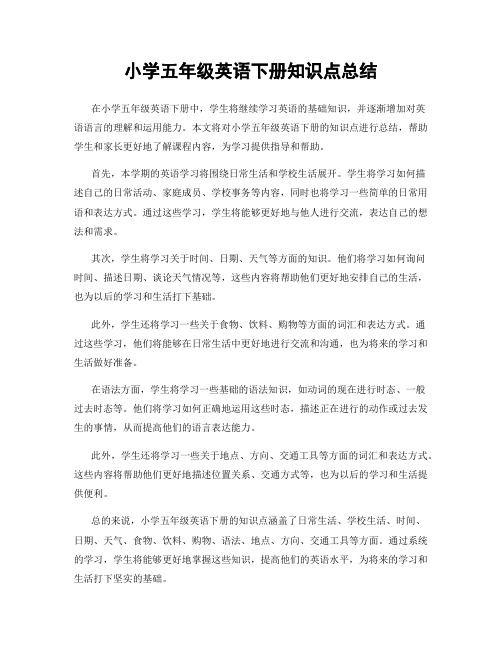
小学五年级英语下册知识点总结在小学五年级英语下册中,学生将继续学习英语的基础知识,并逐渐增加对英语语言的理解和运用能力。
本文将对小学五年级英语下册的知识点进行总结,帮助学生和家长更好地了解课程内容,为学习提供指导和帮助。
首先,本学期的英语学习将围绕日常生活和学校生活展开。
学生将学习如何描述自己的日常活动、家庭成员、学校事务等内容,同时也将学习一些简单的日常用语和表达方式。
通过这些学习,学生将能够更好地与他人进行交流,表达自己的想法和需求。
其次,学生将学习关于时间、日期、天气等方面的知识。
他们将学习如何询问时间、描述日期、谈论天气情况等,这些内容将帮助他们更好地安排自己的生活,也为以后的学习和生活打下基础。
此外,学生还将学习一些关于食物、饮料、购物等方面的词汇和表达方式。
通过这些学习,他们将能够在日常生活中更好地进行交流和沟通,也为将来的学习和生活做好准备。
在语法方面,学生将学习一些基础的语法知识,如动词的现在进行时态、一般过去时态等。
他们将学习如何正确地运用这些时态,描述正在进行的动作或过去发生的事情,从而提高他们的语言表达能力。
此外,学生还将学习一些关于地点、方向、交通工具等方面的词汇和表达方式。
这些内容将帮助他们更好地描述位置关系、交通方式等,也为以后的学习和生活提供便利。
总的来说,小学五年级英语下册的知识点涵盖了日常生活、学校生活、时间、日期、天气、食物、饮料、购物、语法、地点、方向、交通工具等方面。
通过系统的学习,学生将能够更好地掌握这些知识,提高他们的英语水平,为将来的学习和生活打下坚实的基础。
希望本文的总结能够帮助学生和家长更好地理解小学五年级英语下册的知识点,为他们的学习提供指导和帮助。
同时也希望学生能够在老师的指导下,努力学习,掌握这些知识,提高自己的英语水平,为将来的学习和生活做好准备。
最新广州版英语五年级下册知识点汇总

最新广州版英语五年级下册知识点汇总2017最新广州版英语五年级下册知识点汇总:Module 1: SeasonsUnit 1: XXX?Unit 2: It's the middle of winter.Module 2: PlansUnit 3: We are going to have an English test.Unit 4: Have a good time in XXX.Module 3: nsUnit 5: Would you like to go with us?Unit 6: See you at the party.Module 4: XXXUnit 7: We will go by train.Unit 8: Ben's first trip to Beijing.Module 5: SafetyUnit 9: Be careful.Unit 10: How to stay safe?Module 6: nsUnit 11: Can you tell me the way?Unit 12: I know a shortcut.Module 1: SeasonsUnit 1: XXX?Vocabulary:colorful。
prefer。
winter。
either。
autumn。
ski。
plant。
camp。
go camping。
go skiing。
plant flowers。
play outdoors。
look at。
in the tree。
really love。
like swimming。
make a snowman。
fly a kite。
XXX.Key XXX:1.XXX。
- XXX.2.What season do you like best。
- I like spring best.Note: "in the tree" and "on the tree" can both mean "在树上"in Chinese。
最新广州版英语五年级下册知识点汇总
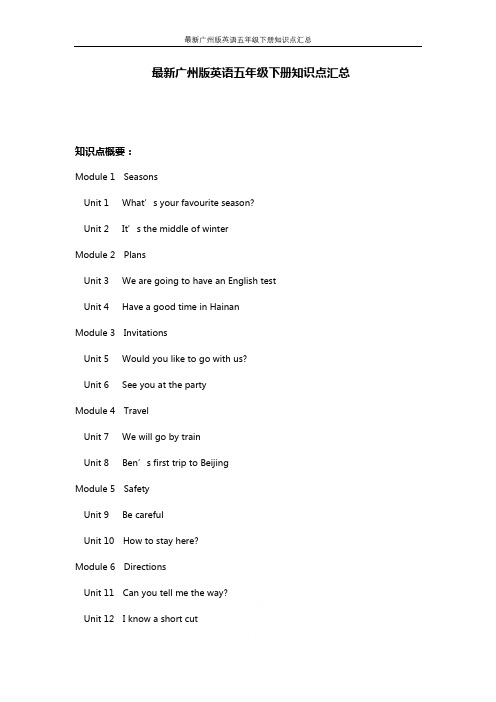
最新广州版英语五年级下册知识点汇总知识点概要:Module 1 SeasonsUnit 1 What’s your favourite season?Unit 2 It’s the middle of winterModule 2 PlansUnit 3 We are going to have an English testUnit 4 Have a good time in HainanModule 3 InvitationsUnit 5 Would you like to go with us?Unit 6 See you at the partyModule 4 TravelUnit 7 We will go by trainUnit 8 Ben’s first trip to BeijingModule 5 SafetyUnit 9 Be carefulUnit 10 How to stay here?Module 6 DirectionsUnit 11 Can you tell me the way?Unit 12 I know a short cut以下为详细内容▼Module 1 SeasonsUnit 1 What’s your favourite season?一、单词短语colourful 多彩的prefer 选择;宁愿winter 冬天either 也autumn 秋天ski 滑雪plant 种植;植物camp 野营;营地go camping 去野营go skiing 去滑雪plant flowers 种花play outdoor 在户外玩look at 看…… in the tree 在树上really love 确实喜欢like swimming 喜欢游泳go skiing 去滑雪make a snowman 堆雪人fly a kite 放风筝favourite season最喜欢的季节二、重点句型:1. --What’s your favourite season?--My favourite season is summer.2. –What season do you like best?--I like spring best.三、重点分析:1. in the tree 和on the tree都可以表示“在树上”;in the tree表示外来的东西在树上;on the tree表示树本身的东西。
广州版小学英语五年级下知识点归纳.doc

.五年级下册知识点Module 1Our Life一、 1)能就“自己的日常生活”的话题进行交谈;2)能就“比较”的话题进行交谈;3)能用用语进行交流。
1、复习时态,特别要掌握好一般现在时第三人称作主语的特殊疑问句:1)How does he/she go to school.2)What time does he/she get up?3)Where does he/she study?4)Whose former pupil lives in Leeds?5)Which school does she study at?6)Who studies at Rose School?2、初步体验形容词比较级的句型:1)He is/looks thinner now than before.2)Is he taller than me?3)Does he look taller than me?4)He isn’tstronger than me.3、情态动词 should 、could 、may 的用法及一些交际用语:1)He should get up early.2)She shouldn ’tplay computer game too much.3) Could you help me?I’d be glad/love to.4)May I sit speak to Jane?5、用语 :-- May I speak to Mr Li?-- This is Ben speaking.注意问题1、总结主语是第三人称单数时, 一般现在时的肯定句 ,否定句和一般疑问句的变化 , 例如:I eat dinner at six.I don’teat dinner at six. Do you eat dinner at six? He eats dinner at six too.He doesn ’teat dinner at six either. Does he eat dinner at six?2、总结主语是第三人称单数时, 一般现在时的特殊疑问句形式, 如:What time does he get up?He gets up at six.Where does she live?She lives in Renmin Road.How does he go to work ?Who hands in the homework? Whose friend practices the piano? Which school does she study at ?He goes to work by bus. Jiamin does.Jane’s friend.She studies at No. 2 School?3. 当主语是第三人称单数时, 一般现在时的动词的变化的规律:1)一般情况加 -s ,例如:visit –visits tell –tells work –works wave –waves 2) 以 s, x, sh, ch尾的 , 加-es ,例如:wash –washes watch –watches catch –catches 3)以音字母加 y 尾的,改 y i 加-es ,例如:fly –flies study –studies4)部分以 o 尾的加 -es ,例如:go –goes do –does5) 特殊情况have –hasUnit 11、for an hourfor 表示的度,例如:for two yearhalf an hour半小an hour and a half一个半小2、注意句型:Could you ⋯ ?I’d be glad to. / I ’d love to.3、比句型:She is older than me.She is one year older than me.4、keep the rule守律;守.Unit 21、用 :May / Could / Can I speak to⋯This is ⋯ speaking. / Speaking.Who ’s this / that?2、He looks thinner now than before.他在看起来比以前瘦很多。
五年级下册英语知识点总结归纳

五年级下册英语知识点总结归纳五年级下册英语知识点总结归纳成功需要成本,时间也是一种成本,对时间的珍惜就是对成本的节约。
接下来店铺为大家编辑整理五年级下册英语知识点总结归纳,希望对大家学习英语有所帮助。
五年级下册英语知识点:名词这里强调两点:不可数名词都默认为单数,所以总是用is或者was。
单数名词表示一个可数事物。
复数名词表示两个或两个以上的可数事物。
1).规则变化①一般在名词后加s.如boy→boys, pen→pens等。
②以s, x, sh, ch结尾的,在后面加es.如bus-buses, box-boxes, brush-brushes, watch-watches.③“以辅音字母+y”结尾的,y变为i,然后再加es.如baby→babies.④以f或fe结尾的名词把f或fe改为v, 再加es. 如knife, half, leaf, wolf等。
⑤以o结尾的名词,除tomato, potato等少数在后面加es外,一般是在后面直接加s.如kilo→kilos,photo→photos,zoo→zoos, radio→radios, piano→pianos, video→videos.2).不规则变化man→men, woman→women, foot→feet, tooth→teeth,,child-children,mouse→mice单复数形式相同如:sheep→sheep, deer→deer, Japanese→Japanese, Chinese→Chinese等。
有些名词形式上是单数,实为复数意义,通常被称为复数名词,如:people, police等。
由-man和-woman构成的合成词如:policeman→policemen, Englishman→Englishmen,Englishwoman-Englishwomen但German不是合成词,故复数形式为Germans.另外被man 或woman 修饰的'名词变复数时,两个名词都要变。
广州版小学英语各年级主要知识点归纳
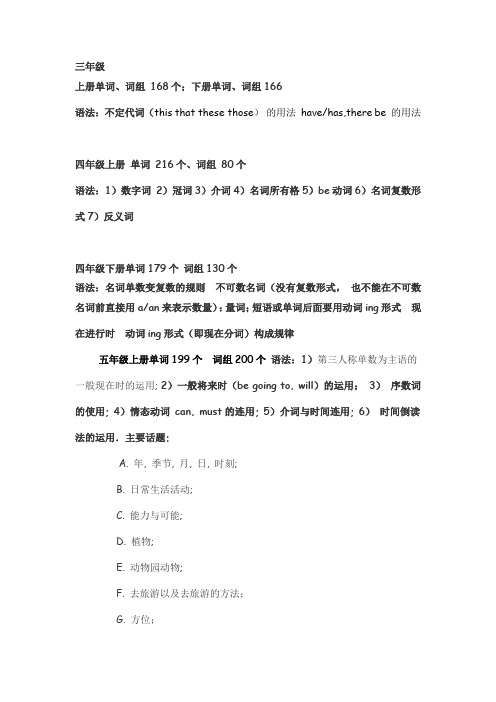
三年级上册单词、词组 168个;下册单词、词组166语法:不定代词(this that these those)的用法have/has,there be 的用法四年级上册单词 216个、词组 80个语法:1)数字词 2)冠词3)介词4)名词所有格5)be动词6)名词复数形式7)反义词四年级下册单词179个词组130个语法:名词单数变复数的规则不可数名词(没有复数形式,也不能在不可数名词前直接用a/an来表示数量):量词;短语或单词后面要用动词ing形式现在进行时动词ing形式(即现在分词)构成规律五年级上册单词199个词组200个语法:1)第三人称单数为主语的一般现在时的运用; 2)一般将来时(be going to, will)的运用; 3)序数词的使用; 4)情态动词 can, must的连用; 5)介词与时间连用; 6)时间倒读法的运用.主要话题:A. 年, 季节, 月, 日, 时刻;B. 日常生活活动;C. 能力与可能;D. 植物;E. 动物园动物;F. 去旅游以及去旅游的方法;G. 方位;H. 问路与应答;I. 规劝与应答五年级下册151个词组125个语法:1)掌握主语为第三人称单数一般现在时的各种句型2)学习和掌握should和shouldn’t的用法3)人称代词和物主代词的用语及正确使用4)形容词、副词的比较级的用法及构成4)I prefer…句型及待客用语的问答5)名词改为形容词的构词方法,如sun— sunny本册书有关于疾病、野生动物、食物等的名词及短语;有关于描述天气特征、人物状态、物体等的形容词还有动词和副词等。
(打电话、看病、询问、量度、用餐、天气)及相关的句型;六年级上册单词107个词组118个六年级下册单词140个词组130个语法:一般过去时;形容词的用法:形容词的比较级变化。
much +比较级;When 引导的时间状语从句--------用when连接前后两个完整的句子;There be句型;宾语从句;时间状语从句;年代的读法;选择疑问句;反意疑问句;连词(and,but,so)的用法;形容物体的形状、颜色、长相等;感叹句的学习;主语+ be 动词+ 形容词;形容词的比较级和最高级;时间表达;情态动词○1can/can’t + 动词原形could/couldn’t + 动词原形○2may/may not + 动词原形○3must/mustn’t + 动词原形(needn’t)Don’t + 动词原形禁止/不允许I hope/wish +句子(can/will/could/动词)我期望……(虚拟)。
广州版小学英语五年级下册教材

广州版英语五年级下册教材Unit 1 What’s your favourite season? (4)➢单词 (4)➢重点短语 (4)➢重点句型 (5)➢课文翻译 (5)➢知识点解析 (5)➢习题 (13)Unit 2 It’s the middle of winter (16)➢单词 (16)➢重点短语 (16)➢重点句型 (16)➢课文翻译 (16)➢知识点解析 (17)➢习题 (30)Unit 3 We are going to have an English test (33)➢单词 (33)➢重点短语 (33)➢重点句型 (34)➢课文翻译 (34)➢知识点解析 (34)➢习题 (46)Unit 4 Have a good time in Hainan (50)➢单词 (50)➢重点短语 (50)➢重点句型 (51)➢课文翻译 (51)➢知识点解析 (51)➢习题 (58)Unit 5 Would you like to go with us ? (64)➢重点短语 (65)➢重点句型 (65)➢课文翻译 (65)➢知识点解析 (66)➢习题 (70)Unit 6 See you at the party (73)➢单词 (73)➢重点短语 (74)➢重点句型 (74)➢课文翻译 (74)➢知识点解析 (75)➢习题 (82)Unit 7 We will go by train (85)➢单词 (85)➢重点短语 (85)➢重点句型 (86)➢课文翻译 (86)➢知识点解析 (86)➢习题 (91)Unit 8 Ben’s first trip to Beijing (95)➢单词 (95)➢重点短语 (95)➢重点句型 (96)➢课文翻译 (96)➢知识点解析 (96)➢习题 (103)Unit 9 Be careful (108)➢单词 (108)➢重点句型 (109)➢课文翻译 (109)➢知识点解析 (110)➢习题 (114)Unit 10 How to stay safe (117)➢单词 (117)➢重点短语 (117)➢重点句型 (118)➢课文翻译 (118)➢知识点解析 (119)➢习题 (123)Unit 11 Can you tell me the way? (126)➢单词 (126)➢重点短语 (127)➢重点句型 (127)➢课文翻译 (127)➢知识点解析 (128)➢习题 (134)Unit 12 I know a short cut (138)➢单词 (138)➢重点短语 (139)➢重点句型 (139)➢课文翻译 (139)➢知识点解析 (140)➢习题 (143)Unit 1 What’s your favourite seas on? ➢单词词汇音标中文c o l our ful [ˈkʌləfl] 多彩的*pr e f er[prɪˈfɜ:(r)] 选择;宁愿要w i nt er[ˈwɪntə(r)] 冬天ei th er[ˈaɪðə(r)] 也au t u mn [ˈɔ:təm] 秋天sk i[sk i:] 滑雪pl a nt [plɑ:nt] 植物c a mp [kæmp] 野营go camping 去野营➢重点短语go skiing 去滑雪really love 确实喜欢plant flowers 种花like swimming 喜欢游泳play outdoors 在户外玩fly a kite / fly kites放风筝look at 看……make a snowman 堆雪人in the tree 在树上➢重点句型1. --What’s your favourite season?--My favourite season is summer.2. –Which season do you like best?--I like spring best.➢课文翻译--Look at all the colourful flowers and the beautiful birds in the trees.--I really love spring. What’s your favourite season,Ben?--Summer. I love swimming and summer is the best time for swimming.--Do you like summer, Jiamin?--I like swimming but I do n’t like summer. It is too hot. I prefer winter.--When it snows, I can make a snowman.--I don’t like summer and I don’t like winter, either.My favourite season is autumn. It’s very windy and I can fly a kite.看看这些五彩缤纷的花朵和树上美丽的小鸟。
小学五年级英语下册第五单元知识学习总结要点整理

小学五年级英语下册第五单元知识点整理www.5ykj.com 一、知识点归纳经典对话A:Lookatthemonkey.看那猴子。
B:whatisitdoing?它在干什么?A:It'seatingbananas.It'shungry.它在吃香蕉。
它饿了。
B:Thatbabykangarooissocute.It'ssleeping.那个小袋鼠多么可爱啊。
它正在睡觉。
A:whataboutthemotherkangaroo?whatisshedoing?那个袋鼠妈妈呢?她在干什么呀?B:She'sjumping.她在跳。
A:Doyouseeanyelephants?Iloveelephants.你看到大象了吗?我喜欢大象。
B:yes.Lookthere!Theelephantisdrinkingwaterwithit'strunk.是的。
看哪里!大象正在用他的鼻子喝水。
必背句型:①问:whatisitdoing?它正在干什么?答:It'seatingbananas.它正在吃香蕉。
②Theelephantisdrinkingwaterwithit'strunk.这句话中的with的意思是“用”。
经典对话A:whatdoyousee?你看见什么了?B:Iseetwoelephants.我看到两只大象。
A:whataretheydoing?它们在干什么?B:Theyaredrinkingwater.它们在喝水。
A:canyouseethemonkey?你看到猴子了吗?B:yes.Theyareswinging.是的,它们正在荡秋千。
必背句型:①问:whataretheydoing?它们在干什么?答:Theyaredrinkingwater.它们在喝水。
②问:canyouseethemonkey?你看到猴子了吗?答:yes./No.是的。
/没有看到。
五年级下册英语伴你学知识梳理
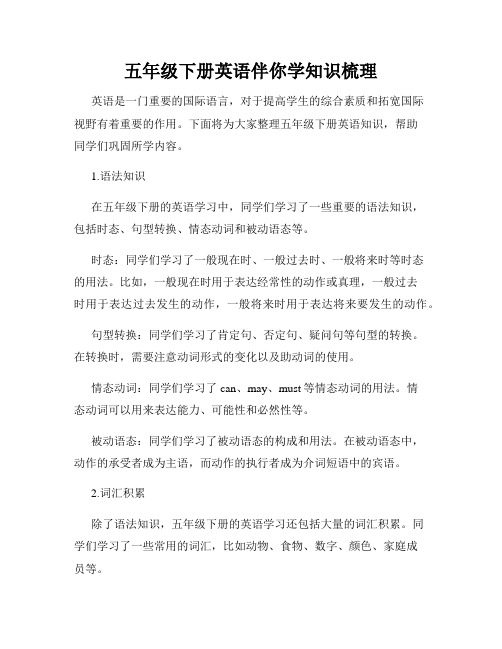
五年级下册英语伴你学知识梳理英语是一门重要的国际语言,对于提高学生的综合素质和拓宽国际视野有着重要的作用。
下面将为大家整理五年级下册英语知识,帮助同学们巩固所学内容。
1.语法知识在五年级下册的英语学习中,同学们学习了一些重要的语法知识,包括时态、句型转换、情态动词和被动语态等。
时态:同学们学习了一般现在时、一般过去时、一般将来时等时态的用法。
比如,一般现在时用于表达经常性的动作或真理,一般过去时用于表达过去发生的动作,一般将来时用于表达将来要发生的动作。
句型转换:同学们学习了肯定句、否定句、疑问句等句型的转换。
在转换时,需要注意动词形式的变化以及助动词的使用。
情态动词:同学们学习了can、may、must等情态动词的用法。
情态动词可以用来表达能力、可能性和必然性等。
被动语态:同学们学习了被动语态的构成和用法。
在被动语态中,动作的承受者成为主语,而动作的执行者成为介词短语中的宾语。
2.词汇积累除了语法知识,五年级下册的英语学习还包括大量的词汇积累。
同学们学习了一些常用的词汇,比如动物、食物、数字、颜色、家庭成员等。
为了巩固词汇,同学们可以通过背单词卡片、进行词汇游戏等方式来进行复习和记忆。
记忆词汇时,可以使用联想法、造句法等方法,使词汇更加深入人心。
3.阅读理解阅读理解是英语学习的重要部分,通过阅读不同的文章,同学们可以提高阅读理解能力,扩大词汇量并培养正确的阅读习惯。
在五年级下册的英语学习中,同学们接触到了一些简单的阅读理解题目,包括选择题、判断题和填空题等。
在解答这些题目时,同学们需要仔细阅读文章,并根据文章内容进行准确的判断和选择。
4.口语练习英语口语是英语学习中至关重要的一部分,通过口语练习,同学们可以提高语音、语调和流利度。
在五年级下册的英语学习中,同学们学习了一些日常用语和简单的对话。
为了提高口语能力,同学们可以多与同学进行练习,模拟真实对话场景,培养语言表达的自信。
5.写作训练写作是英语学习的重要方面,通过写作训练,同学们可以提高语法应用能力和写作表达能力。
最新广州版英语五年级下册知识点汇总
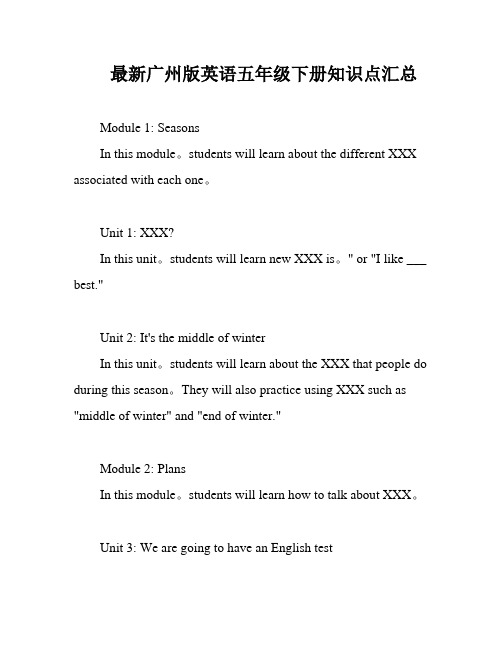
最新广州版英语五年级下册知识点汇总Module 1: SeasonsIn this module。
students will learn about the different XXX associated with each one。
Unit 1: XXX?In this unit。
students will learn new XXX is。
" or "I like ___ best."Unit 2: It's the middle of winterIn this unit。
students will learn about the XXX that people do during this season。
They will also practice using XXX such as "middle of winter" and "end of winter."Module 2: PlansIn this module。
students will learn how to talk about XXX。
Unit 3: We are going to have an English testIn this unit。
students will learn how to express future plans using the phrase "going to." They will also XXX。
Unit 4: Have a good time in HainanIn this unit。
students will learn about the tropical island of Hainan and the activities that people do there。
They will also practice using the XXX ing trips and events。
小学五年级下册英语知识点,直接打印版

M1U1一、词形转换1.1ady(复数)ladies2.life(复数)lives3.different(对应词)same4.ago(近义词)before5.interviewer(动词原形)interview6.television(缩写)TV7.grandchildren(单数)grandchild8.night(对应词)day9.worker(动词原形)work10radio(复数)radios11couldn’t(完全形式)could not12write(过去式)wrote13.write(同音词)right二、短语1.两只漂亮的猫two beautiful cats2.在椅子上on the chair3.在英国in the UK4.和萨姆艾米一起with Sam and Amy5.一个关于中国的节目a programme about China6.非常不同very different7.许多年以前many years ago8.住在一所小房子里live in a small house9.足够的食物enough food10.许多公共汽车many buses11.住在一-所大房子里live in a big house12.许多食物lots of food13.每天every day14.为..谢谢你thank you for.15.想念中国miss China16.想念我的奶奶miss my grandma三、重点句子1.它是一一个关于中国的电视节目。
It’s a programme about China.2.在许多年前,中国的生活很不同。
Life was very different in China many years ago.3.我们住在一所小房子里。
We lived in a small house.4.没有任何的电视。
There weren’t any televisions.5.昨天晚上我和我的孙子孙女们一起看电Life was very different in China many years ago.M1U2一、词形转换1.talk(过去式)talked2.cook(过去式)cooked3.work(过去式worked4.can(过去式)could5.write(过去式)wrote6.write(同音词)right7.hope(过去式)hoped8.could(否定)couldn’t二、短语1.强壮的腿strong legs2.跳得非常远jump really far3.一个关于中国的电视节目a television programme about China4.昨天晚上last night5.-位老妇人an old lady6.在田地里in the fields7.在炉火上烹饪cook on a fire8.台收音机a radio9.想念我的奶奶miss my grandmaShe didn’t have a television.2.她不能读也不能写。
五年级英语下册第二单元知识点归纳
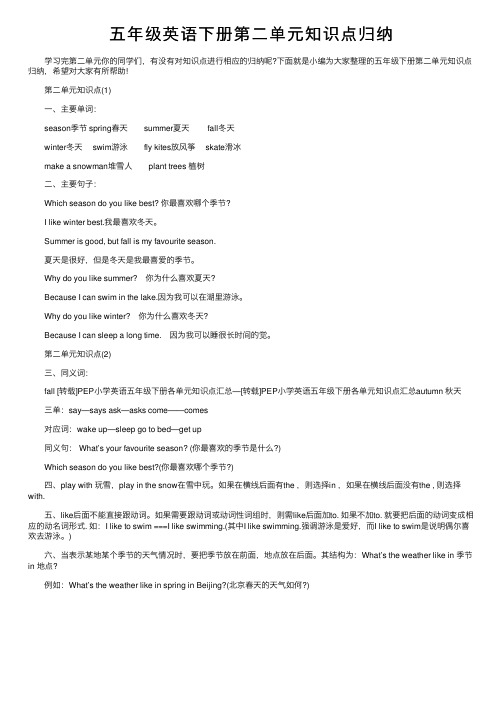
五年级英语下册第⼆单元知识点归纳 学习完第⼆单元你的同学们,有没有对知识点进⾏相应的归纳呢?下⾯就是⼩编为⼤家整理的五年级下册第⼆单元知识点归纳,希望对⼤家有所帮助! 第⼆单元知识点(1) ⼀、主要单词: season季节 spring春天 summer夏天 fall冬天 winter冬天 swim游泳 fly kites放风筝 skate滑冰 make a snowman堆雪⼈ plant trees 植树 ⼆、主要句⼦: Which season do you like best? 你最喜欢哪个季节? I like winter best.我最喜欢冬天。
Summer is good, but fall is my favourite season. 夏天是很好,但是冬天是我最喜爱的季节。
Why do you like summer? 你为什么喜欢夏天? Because I can swim in the lake.因为我可以在湖⾥游泳。
Why do you like winter? 你为什么喜欢冬天? Because I can sleep a long time. 因为我可以睡很长时间的觉。
第⼆单元知识点(2) 三、同义词: fall [转载]PEP⼩学英语五年级下册各单元知识点汇总—[转载]PEP⼩学英语五年级下册各单元知识点汇总autumn 秋天 三单:say—says ask—asks come——comes 对应词:wake up—sleep go to bed—get up 同义句: What’s your favourite season? (你最喜欢的季节是什么?) Which season do you like best?(你最喜欢哪个季节?) 四、play with 玩雪,play in the snow在雪中玩。
如果在横线后⾯有the ,则选择in ,如果在横线后⾯没有the , 则选择with. 五、like后⾯不能直接跟动词。
五下期中英语知识点总结

五下期中英语知识点总结
一、语音知识
1. 元音字母和辅音字母的认读及规律。
2. 单词重读音节的划分规则。
二、词汇知识
1. 五年级英语单词的拼写、读音和意义。
2. 五年级英语词组的掌握和运用。
3. 五年级英语中的常用短语及其用法。
三、语法知识
1. 五年级英语中的各种句型和语法结构。
2. 五年级英语中的名词、代词、形容词、副词、动词、情态动词等的用法及在句子中的运用。
3. 五年级英语中的时态、语态、语气等相关知识。
4. 五年级英语中的疑问句、否定句、祈使句等特殊句型的构成和运用。
四、阅读知识
1. 阅读五年级的英语教材、课外读物,掌握阅读理解的技巧。
2. 掌握阅读策略,提高阅读速度和理解能力。
3. 了解阅读难点,提高阅读理解的效果。
五、写作知识
1. 掌握五年级英语书面表达的规范格式和基本要求。
2. 掌握写作技巧,提高写作水平。
3. 了解写作的要点和写作的难点,改善写作方法,提高写作质量。
总结五年级英语的知识点,对于进一步提高语言能力和应对考试有着重要的意义。
在学习英语过程中,要善于总结经验,多加练习,不断提高自己的语言能力。
希望同学们能够在五年级英语学习中取得更好的成绩。
广州版五年级英语下册重要考点归纳

五年级英语下册重要考点Unit 1. What ’s your favourite season?1. in the tree (外来物在树上) on the tree (长在树上)2. the best time to + V 原 the best time for +V-ing/名词3. I don ’t like summer, and Idon’t like winter , either. too (用于肯定句)“也”either (用于否定句)also -------------------- 放句中4. go skiing (去滑雪) go skating (去溜冰)5. prefer 更喜欢(用于两者之间做选择)6. --What ’s your favourite season? 你最喜欢的季节是什么? 答:My favourite season is +季节.● Season (季节):spring(春), summer(夏), autumn(秋), winter(冬) ● Month (月份):January, February, March, April, May, June,July, August, September, October, November, DecemberUnit 2. It ’s the middle of winter 1. in the middle of …在…的中间/中期eg: The park is in the middle of the city. 这座公园在城市的中间。
2. say to sb. 对某人说3. He is visiting me for the summer holidays. for 表示原因,由于在放假,所以来看我。
4. How do you have a summer holiday? (how 表示怎么、怎样)5. I am from Astralia. ( be from = come from 来自) eg: I am from China. = I come from China.6. too …to …(+V 原) 太…以致不能… eg: It ’ s too cold to swim now.7. What’s summer like in Australia? 澳大利的夏天怎么样?(问天气)What’s …like? …怎么样?形容天气的形容词:hot, cold, warm, cool, wet, dry, windy, sunny, snowy, rainyUnit 3. We are going to have anEnglish test1. 问日期:--What’s the date today? --It’s +日期.2. 问星期:-- What day is it today? --It’s +星期.3. 日期的表达:月份+the+序数词June the 23rdthe +序数词+of+月份the 23rd of June (写法:June 23rd)4.基数词变序数词5. on+具体日期/星期(的早上、下午、晚上)Eg : on June 11th, on the morning of June 11th ,on Monday, on Monday afternoon6.Is there anything else important next month?Is there问,there is 答。
广州版小学英语五年级下册:Unit 11 Can you tell me the way

Unit 11 Can you tell me the way?Focus PointsLet’s TalkDo you know the way to the market from your house? How can you get there? Please talk about it with your partner.Warming Up一.听写二、单词及短语1.在......后面______________________2. 在......旁边_____________________3.靠近,紧邻_____________________4. 在...... 前面____________________5.在右边_________________________6. 在左边________________________7.在......附近______________________8. 方向__________________________9. 路_____________________________ 10. 迷路的_______________________ 11. 医院__________________________ 12. 笔直地_______________________ 13. 错过__________________________ 14. 银行_________________________ 15. 邮局__________________________ 16. 火车站_______________________ 17. 饭店__________________________ 18. 警察局______________________三.课文内容根据提示把句子补充完整。
Janet: Oh, dear! I think we’re________.Ben: Let’s go and ask the lady ________ there.Janet: Excuse me. ________ you tell me the ________ ________ the hospital, please?Lady: Of course. Let me see. Go ________ ahead then turn right ________ the second ________. Ben: Is the hospital on the left ________ on the right?Lady: It’s the building on your right, ________ to the school. You can’t ________ it.Janet and Ben: Thank you so much.Language Points【知识考点一】Can you tell me the way to the hospital, please? 请问你能告诉我去医院的路吗?the way to... 意为“到......的路”can意为“能,可以”,是情态动词,无人称和数的变化,后面接动词原形。
广州版小学英语五年级下册:Unit-5-Would-you-like-to-go-with-us
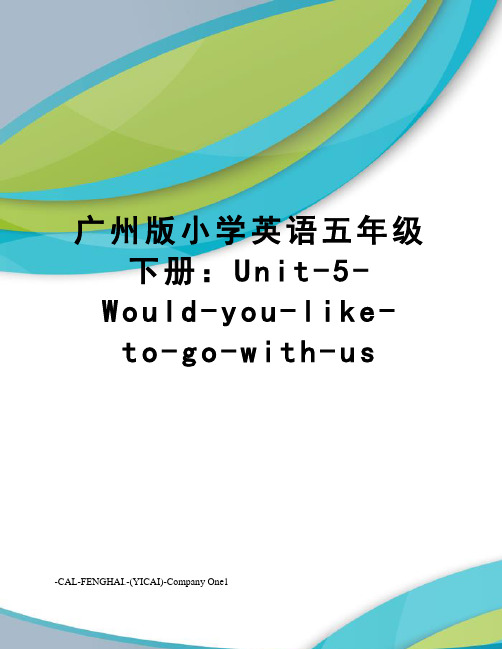
广州版小学英语五年级下册:U n i t-5-W o u l d-y o u-l i k e-t o-g o-w i t h-u s-CAL-FENGHAI.-(YICAI)-Company One1Unit 5 Would you like to go with us?Focus PointsLet’s TalkIf tomorrow is your birthday, you are going to have a party. And you want to invite your classmates and your friends, how can you invite themWarming Up一.听写二.单词及短语1.邀请_______________________2. 将会___________________________3.没有东西___________________4. 听起来不错 ____________________5.大门_______________________6. 没有问题_______________________7.比赛_______________________8. 中心__________________________9. 超市_______________________ 10. 计划去做______________________11. 去野餐____________________ 12. 在学校门口____________________13. 举行一个派对 _____________ 14. 看电影_______________________15. 观看一场足球赛 ___________三.课文内容根据提示把句子补充完整。
Janet: Hey, guys. What are you doing this Saturday?Ben: Nothing. Why?Janet: My cousin and I plan to go ________ ________ _________. Would you________ ________ _________ with usJiamin: A picnicThat ________(听起来)great!Ben: What time ________ we go?Janet: Let’s meet ________ the school gate ________9:00 a.m.We can all go to the partytogether.Ben: Cool. The picnic is this Saturday, August 14th , right?Jiamin: Oh dear. I’m sorry but I am going to my grandma’s birthday party that day. Janet: No problem. Maybe ________ ________(下次).Language Points【知识考点一】Would you like to go with us 你(们)想要和我们一起去吗句型结构:Would you like to +动词原形+其他?该句型用于询问对方是否愿意做某事。
小学五年级英语下册知识点总结

M10U1-------重点词组:1. this weekend 这个周末2. I don’t know 我不知道3. I think so 我也这样认为4. all right 没事,没问题5. make a list of things to do 列一个要做事情的清单6. safe trip 旅行安全,一路顺风7. feel nervous 感觉到紧张重点句型:1.Where are you going this weekend, Sam?萨姆你这个周末要去哪里?2.When are you going to get up ?你将要什么时候起床?3.Mum ,what did you say to me ?妈妈,你刚刚对我说了什么?4.Are you ready for your trip tomorrow ?你准备好你明天的旅行了吗?5.I’m going to meet you in New York .我将要在纽约接你。
6.You can make a list of things to do .你可以列一个要做事情的清单7.What are you going to take ? 你将要带什么东西?8.When are you going to the airport?你什么时候去机场?9.Who’s going to the airport with you ?谁将要跟你一起去?U2-------重点词组:1. arrive there 到那2. at the airport 在机场3. take a yellow taxi 乘坐一辆黄色出租车4. lots of tall building 许多高大的建筑物5. find out 找到、发现6. a big exciting word 一个令人激动的大世界7. by plane 乘飞机8. have a party 举办一个聚会9. sing a song 唱一首歌10. play a game 玩个游戏11. make a plan 制作一个计划12. at the zoo 在动物园里13. take lots of photos 照了许多照片重点句型:1.I’m in New York now. 我现在在纽约。
教科版(广州)英语五年级下册全册知识点归纳

教科版五年级下册基础知识汇总Unit !What's your favourite season?【重点单词】1.colourful多彩的 5.ski滑雪2.winter冬天 6.plant种植;植物3.either也7.camp野营:营地4.autumn秋天8.prefer选择,宁愿要【重点短语】I.go skiing去滑雪7.in the trees在树上2.plant flowers丰中花8.favourite season最喜欢的季节3.play outdoors在户外玩耍9.too hot太热4.go camping去野营10.make a snowman堆雪人5.colourful flowers多彩的花11.fly a kite放风筝6.beautiful birds 漂亮的鸟12.eat ice cream吃冰激凌【重点句子】1.-What’s your favourite season,Ben?本,你最喜玫什么季节?-Summer.夏天。
I)此问句用于湖问对方最喜欢付么季节。
2)答语为“(My favourite season is十)季节名称.”。
3)其中your是形容词性物主代词,意为“你的:你们的”。
4 )fav omite的意思是“最喜欢的”。
例如:-What’s your 臼vomite season, Mike?迈克,你最喜欢什么季节?-Winter.冬天。
2.1 love swimming and summer is the best time for swimming.我喜欢游泳,夏天是游泳最好的时候。
l)Ei11:t称十比川巳st time for+t9J词叫形式(十其他)明来描述某季节是做某活动最好的时候。
2)其中best意为“最好的”。
3)for是介词,后接动词ing形式。
例如:Winter is the best time for skiing.冬天是泪’雪最好的时候。
- 1、下载文档前请自行甄别文档内容的完整性,平台不提供额外的编辑、内容补充、找答案等附加服务。
- 2、"仅部分预览"的文档,不可在线预览部分如存在完整性等问题,可反馈申请退款(可完整预览的文档不适用该条件!)。
- 3、如文档侵犯您的权益,请联系客服反馈,我们会尽快为您处理(人工客服工作时间:9:00-18:30)。
五年级下册知识点Module 1 Our Life一、1)能就“自己的日常生活”的话题进行交谈;2)能就“比较”的话题进行交谈;3)能用电话用语进行交流。
1、复习时态,特别要掌握好一般现在时第三人称作主语的特殊疑问句:1) How does he/she go to school.2) What time does he/she get up?3) Where does he/she study?4) Whose former pupil lives in Leeds?5) Which school does she study at?6) Who studies at Rose School?2、初步体验形容词比较级的句型:1) He is/looks thinner now than before.2) Is he taller than me?3) Does he look taller than me?4) He isn’t stronger than me.3、情态动词should、could、may的用法及一些交际用语:1) He should get up early.2) She shouldn’t play computer game too much.3) Could you help me? I’d be glad/love to.4) May I sit speak to Jane?5、电话用语:-- May I speak to Mr Li?-- This is Ben speaking.注意问题1、总结主语是第三人称单数时, 一般现在时的肯定句,否定句和一般疑问句的变化, 例如:I eat dinner at six. He eats dinner at six too.I don’t eat dinner at six. He doesn’t eat dinner at six either.Do you eat dinner at six? Does he eat dinner at six?2、总结主语是第三人称单数时, 一般现在时的特殊疑问句形式, 如:What time does he get up? He gets up at six. Where does she live? She lives in Renmin Road.How does he go to work?He goes to work bybus.Who hands in the homework? Jiamin does.Whose friend practices the piano? Jane’s friend.Which school does she study at ? She studies at No. 2 School?3. 当主语是第三人称单数时, 一般现在时的动词的变化的规律:1) 一般情况加-s,例如:visit – visits tell – tells work – works wave – waves2) 以s, x, sh, ch结尾的动词, 加-es,例如:wash – washes watch – watches catch – catches3) 以辅音字母加y结尾的动词,改y为i加-es,例如:fly – flies study – studies4) 部分以o结尾的动词加-es,例如:go – goes do – does5) 特殊情况have – hasUnit 11、for an hourfor 表示时间的长度,例如:for two yearhalf an hour 半小时an hour and a half 一个半小时2、注意句型:Could you …?I’d be glad to. / I’d love to.3、比较级句型:She is older than me.She is one year older than me.4、keep the rule 守规律;守规则Unit 21、电话用语:May / Could / Can I speak to …This is … speaking. / Speaking.Who’s this / that?2、He looks thinner now than before. 他现在看起来比以前瘦很多。
look看起来3、be worried about … 担心4、be late for school 上学迟到5、hand in 交;递交6、on time / in time 依时;按时7、catch up with 赶上8、比较:take (more) exercise have sportstake morning exercises take eye exercisesUnit 31、区别sleep / sleepy / asleepsleep v. 睡觉He is sleeping on his mother’s bed. 他睡在他妈妈的床上。
sleepy adj. 困的I’m sleepy. I want to go to bed. 我很困,我想睡觉。
asleep adj. 睡熟了He is fast asleep. 他很快睡觉。
2、ten more minutes 十来分钟3、Did You Know: 1. Don’t be la te for party. 参加聚会不要迟到。
2. Don’t ask adults about ages. 不要文成年人关于他们的年龄。
3. Don’t talk to others when there’s too much foodin your mouth. 在满嘴是食物是不要根别人说话。
Module 2 Seeing a Doctor能就“看病”的话题进行交谈。
1、看病用语:医生用语1) You should drink plenty of water.2) Y ou shouldn’t go to bed late.3) You’d better stay in bed.4) Don’t eat too much chocolate.病人用语1) What’s the matter?2) I feel ill/bad.3) Take the medicine three times a day.4) I have a cold/headache/stomachache/toothache.2、生活用语:1) It’s time to get up.2) I don’t want to be late for school.注意的问题:1、注意一些合成词的构成以前学过合成词,如:football chalkboard bedroom本模块出现的合成词:-achehead –headache tooth –toothache stomach –stomachache2、有情态动词should的句子的肯定式、否定式和一般疑问式:We should get there before eight.We shouldn’t (should not) get there too late.Should we get there before nine?Unit 41、It’s time to…与It’s time for…的区别:It’s time for bed /class/school/breakfast/lunch/dinner.(time 后加名词)It’s time to go to bed/school/have breakfa st/have lunch/have dinner. (time后加动词)2、联系动词fell / look / get/ become等后可以加形容词,例如:I feel tired / hot / cold / hungry.He looks tired / hungry / pale.Unit 51、What’s the matter? / What’s the matter with you?2、give s.b. a checkup 给(某人)检查身体3、plenty of 大量的(可修饰可数或不可数名词)There is plenty of water.There are plenty of eggs in the basket.4、walk a lot 走很多路eat a lot 吃很多东西5、take the medicine three times a day 一天服药三次6、take long 花很多时间7、Never too much of good food. 好的东西也不能吃太多。
8、airsick 晕机backache 背疼earache 耳疼hurt 伤;疼得Module 3 Our School and Our Class1、能就“自己学校和班级”的话题进行交谈。
2、能就“比较建筑物”的话题进行交谈。
1、巩固形容词比较级和副词比较级的句型1) His school is better than mine.2) My new school is much larger than the old one.3) Does the new school have more classroom than the old one?4) She gets up earlier than us2、情态动词would及must、need的否定式的用法及一些交际用语:1) You needn’t go to school by bus.2) We mustn’t pick the flowers.3) Would you like to visit our new school? Yes, I’d love to.4) Welcome to our school. Thank you.注意的问题:1、比较两样(种)东西时形容词的变化形容词和副词的比较级:A.一般单音节和部分双音节的形容词的比较级在词末加-er:small – smaller new – newer old – older tall – taller weak – weaker short – shorter cheap – cheaperfresh – fresher clean -- cleaner; fast – fasterB.以不发音的单音节和部分双音节的形容词的比较级,在词末加-r:nice – nicer fine – finer large – larger white – whitercute – cuter; late – laterC.以辅音字母加y的单音节和部分双音节的形容词的比较级把y改为i, 加er:easy – easier ugly – uglier heavy -- heavier friendly – friendlier hungry –hungrier tidy – tidier happy – happier pretty – prettier; sorry – sorrier early – earlierD.以单元音字母加一个辅音字母结尾的单音节形容词和副词双写最后一个字母加-er:big – bigger fat – fatter thin – thinnerE.部分单词属于不规则:good/well – better bad/badly – worse many – more例句:1) This dictionary is thinner than that one.2) Is your shirt better than mine?3) Does our classroom look bigger than yours?4) My mother always gets up earlier than me.【巩固练习】1.My brother is two years _________ (old) than me.2. Is your sister _________ (young) than you? Yes,she is.3. Who is __________ (thin),you or Helen? Helen is.4. Whose pencil-box is _________ (big),yours or hers? Hers is.5.Ben jumps ________ (high) than some of the boys in his class.6.Does Nancy sing __________ (well) than Helen? Yes, she does.7.My eyes are __________(big) than hers.8.Which is __________ (heavy),the elephant or the pig? 9.Who gets up ________ (early),Tim or Tom?10.Do the girls get up_______(early) than the boys? No,they______.2、代词的作用:例句:1) I often help him and he often help me too.2) They like us and we like them too.3) My house is smaller than your house. Yours is larger than mine.4) Our pictures are better than their pictures. Ours pictures are better than theirs.【巩固练习】1. ___my_____(我的) sister is going to give ___him______(他) a dictionary.2. __we______(我们) lived with _____our___(我们的)grandparents ten years ago.3._______ (他的) house is beautiful, but _________(你的) is so small.4.Whose books are these? Are they _______(他们的) or________(你们的)?5.Is the balls for __________ (我们) or __________ (他们)?6.Let _____us_____ (我们) go and see __her________ (她).7.Could you show __________ (我) your new story-book? 8.This pen isn’t __________ (我的). It’s __________ (你的).9.__________ (她) does __________ (她的) homework from eight to nine.10.Does __________ (他) often help ___________ (你们)?Yes, He often comes here and helps __________ (我们).翻译句子:1、谁比Jim年纪大?是你。
